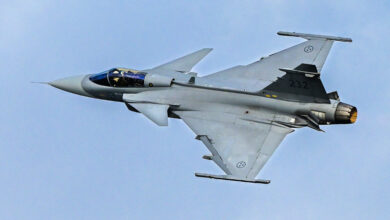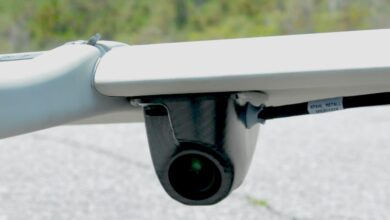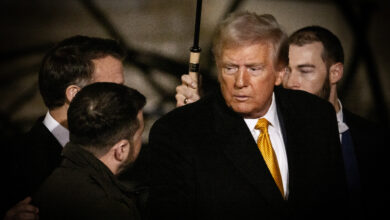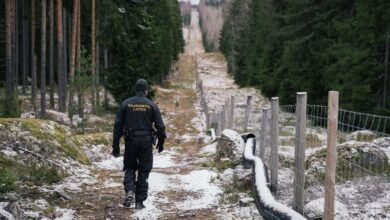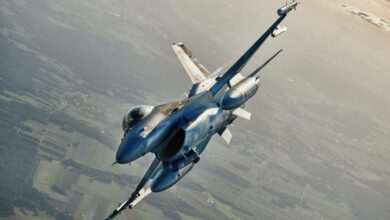
On December 16, 1957, President Dwight D. Eisenhower called on NATO members to confront the Soviet threat, stating that the “peace we seek will not be had for nothing. Indeed, its price will be high. But it need not dismay us. Our free peoples possess ample resources wherewith to meet every threat. The only question is, will we do so? Will we, in freedom, pay the price necessary to preserve freedom?”
Today, the international community is being asked that question again, as Russia besieges Ukraine.
The answer is clear: to save lives and preserve freedom, we should answer President Volodymyr Zelensky’s repeated call to enforce a no-fly zone, even if it’s limited, or prioritize the need for air defense systems because as he noted to Congress “Russia has turned the Ukrainian sky into a source of death for thousands of people.”
As every day passes in this unprovoked war, more people are displaced, injured, or killed. Brave Ukrainians are standing in front of tanks and civilians are taking up arms to defend their freedom.
President Zelensky and the Ukrainian people are courageously trying to hold on to their lives, their country’s sovereignty, and its democratic values.
Putin’s Horrors
We know the horrors Russia’s dictator Vladimir Putin is capable of.
His forces have killed an American journalist, jeopardized the safety of nuclear facilities, ignored agreed upon humanitarian corridors to shell Ukrainian civilians, reportedly forcibly putting Ukrainians into Russian camps, and repeatedly bombed civilians — a maternity children’s hospital, a cancer hospital, a care home for the disabled, a mosque, and an Orthodox Christian monastery, a shopping mall, an art school, and a theater. These are just some examples of the true essence of Putin’s brutality.

Chemical or Biological Weapons
The White House has warned that Putin may use chemical or biological weapons in Ukraine but that should not be surprising. The Kremlin helped Syria’s Bashar al-Assad level Aleppo and use chemical weapons, including sarin and chlorine bombs, against his own people.
In Syria, Putin lied and spread misinformation that opposition fighters were the ones who had used chemical weapons.
Now, we are hearing an eerily familiar echo as Putin falsely claims that Ukraine has biological weapons. Do we want to wait until Russia starts gassing civilians in Ukraine to act?
No-Fly Zone Concerns
It is a legitimate concern that a no-fly zone in Ukraine may lead to a direct confrontation with Russia – with unpredictable consequences – but we should be clear that it is Putin, not the US, who is behind this senseless war.
Fears of a direct confrontation would not prevent us from acting if Putin moved against a NATO country, triggering Article 5 — and it should not stop us now.
Ukraine is not owed the legal obligation compared to our NATO allies. But the threat Russia poses to democracy, sovereignty, the rule of law, and freedom itself calls on us to take extraordinary measures.

As in President Eisenhower’s time, the real question is what happens if we do not act now, before it is too late?
A negotiated no-fly zone can be imposed in Ukraine with a deconflicting back-channel line with Russia. This same policy was instituted in Syria where Russians and Americans have thus far avoided a shooting war despite the close proximity of forces for years.
Humanitarian Safe Zone Corridor
Another idea could be to create protected areas, like a humanitarian safe zone corridor, to ensure that civilians are protected to the maximum extent possible and humanitarian supplies are disseminated.
Managing the sky above Ukraine for humanitarian purposes and to prevent further human suffering should not be about some arbitrary line between NATO countries and Ukraine.
This is a distinction without a difference evidenced by the parliaments of Lithuania, Estonia, and Latvia as well as the prime minister of Slovenia who have all come out in support of a no-fly zone.
This reality has become clearer as Putin’s attacks creep closer to the border with Poland, launching missiles toward Lviv, and threatening to attack arms shipments as legitimate targets.
Beyond acting to reduce the wanton slaughter of civilians, the US should also reaffirm the Budapest Memorandum signed in 1994, in which Ukraine gave up its nuclear stockpile in exchange for security assurances.
Signals of Weakness
The United States and its European allies – now trying to do the right thing by applying sanctions against Russia and sending arms to Ukraine – also need to acknowledge that their misguided decisions of the past may have, in part, played a role leading up to this war.
Cozying up to Putin for oil, the US granting Russia permanent normal trade relations in 2012, failing to issue robust Magnitsky sanctions against Russian officials and oligarchs, delaying lethal aid to Ukraine, obstructing efforts to supply Ukraine with MiG fighter jets or equivalent aircraft, and blocking Ukraine from entering NATO — it all sent signals of weakness to the Kremlin.

Nobel Peace laureate and Holocaust survivor Elie Wiesel once stated: “Sometimes we must interfere. When human lives are endangered, when human dignity is in jeopardy, national borders and sensitivities become irrelevant. Wherever men or women are persecuted because of their race, religion, or political views, that place must—at that moment—become the center of the universe.”
Today, Ukraine is the center of the universe. Innocent, men, women, and children there are yearning for protection from indiscriminate bombs, including hypersonic missiles. They are calling on us to interfere. Will we heed the call?
As President Eisenhower affirmed, if free people have the courage, they will have the resources to meet every threat. This includes Putin’s threats.
With the war in its fourth week and as Russia further encircles Kyiv, a failure to act decisively and swiftly could be catastrophic.
 Eddy Acevedo is chief of staff and senior adviser to Ambassador Mark Green, president and CEO of the Woodrow Wilson International Center for Scholars.
Eddy Acevedo is chief of staff and senior adviser to Ambassador Mark Green, president and CEO of the Woodrow Wilson International Center for Scholars.
He formerly was national security adviser at the US Agency for International Development and staff director for the Subcommittee on the Middle East and North Africa for former Rep. Ileana Ros-Lehtinen (R-Fla.).
This opinion is solely that of the author and does not represent the views of the Wilson Center.
The views and opinions expressed here are those of the author and do not necessarily reflect the editorial position of The Defense Post.
The Defense Post aims to publish a wide range of high-quality opinion and analysis from a diverse array of people – do you want to send us yours? Click here to submit an op-ed.



